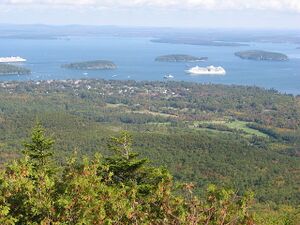Maine community action

The aim of this page is to recognise, celebrate and encourage the self-empowerment of community agency networks (CANs) and community groups' activism for climate, environment and many other sustainability topics across Maine.
 The US’s Easternmost City Could Be a Model for the Country’s Renewable Future, insideclimatenews.org (Nov 18, 2024)
The US’s Easternmost City Could Be a Model for the Country’s Renewable Future, insideclimatenews.org (Nov 18, 2024)  Why Europe is dismantling its dams, BBC Future (Mar 05, 2024)
Why Europe is dismantling its dams, BBC Future (Mar 05, 2024)
- 'I'm not a quitter': lobstermen turn to kelp farming in the face of climate crisis, May 19, 2020...theguardian.com
Networks and sustainability initiatives[edit | edit source]
Events[edit | edit source]
Ecovillages[edit | edit source]
Belfast Cohousing & Ecovillage
Community energy[edit | edit source]
Wikipedia: Solar power in Maine, Wind power in Maine
Education for sustainability[edit | edit source]
College of the Atlantic, Environmental Commitment, Sustainability at COA
Urban sustainability[edit | edit source]
Citizens data initiative[edit | edit source]
Maine Watershed Data From Environmental Protection Agency - U.S. EIA Energy Profile for Maine, economic, environmental and energy data
About Maine[edit | edit source]
Maine ( MAYN) is a state in the New England region of the United States, and the northeastern most state in the Lower 48. It borders New Hampshire to the west, the Gulf of Maine to the southeast, and the Canadian provinces of New Brunswick and Quebec to the northeast and northwest, and shares a maritime border with Nova Scotia. Maine is the largest state in New England by total area, nearly larger than the combined area of the remaining five states. Of the 50 U.S. states, it is the 12th-smallest by area, the 9th-least populous, the 13th-least densely populated, and the most rural. Maine's capital is Augusta, and its most populous city is Portland, with a total population of 68,408, as of the 2020 census.
